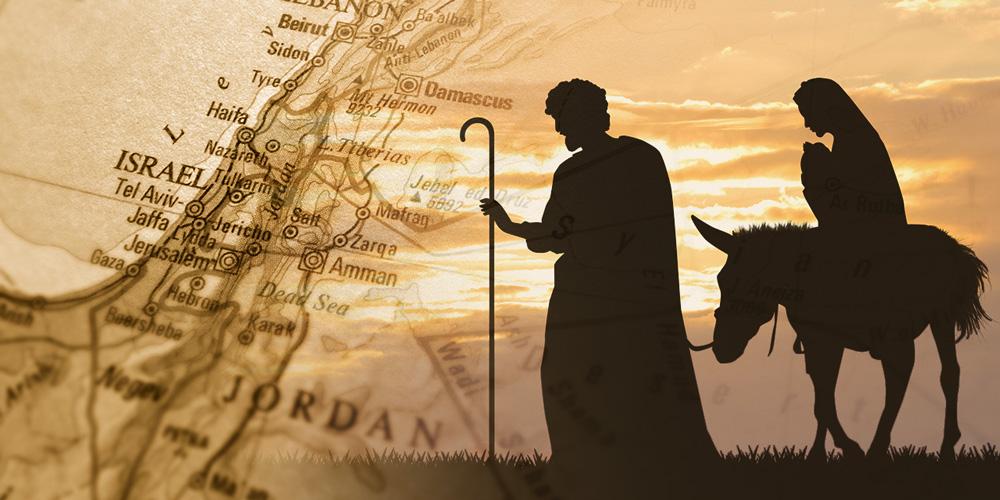Jesus was not a Palestinian. It is true that Jesus came for all people, but His Jewish identity matters. Describing Jesus as a Palestinian is becoming increasingly common practice in churches where Replacement Theology is taught and pro-Palestinian bias against Israel has taken root.
This problem seems a lot more prominent this year as some try to make it relevant to the current situation in Gaza by misappropriating Jesus as a Palestinian, living ‘under occupation’, in an effort to accuse Israel of mistreating Palestinians. Known as Palestinian Liberation Theology, churches that promote this are actually abetting a very hostile attempt by Palestinian Muslims to deny the Jewishness of Jesus. It is another method to undermine the Jewish connection to the Land of Israel and separate Jesus from the people of Israel and his Jewish identity. It tries to redefine Jesus as a political freedom fighter who stands against Israel. This deception is rampant in pro-Palestinian advocacy, but is also misleading many others. Sadly, it risks separating Christians further away from the Jewish identity of our faith and creating a further chasm between Christians and Jews.
The smear that Jesus was a Palestinian can be countered historically and Biblically. Beginning with historical accuracy, there was no such place called Palestine before Jesus was born, when he was born or for his entire life. It was in the second century that the Romans renamed Judea, ‘Syria Palaestina’. They did this to obliterate the link between the Jews and the Land of Israel, which is no coincidence considering that this is the same motive behind those insisting Jesus was Palestinian. The word ‘Palestine’ has, of course, been used in the region for centuries, including the Mandate of Palestine. But it is very unusual to denote an identity to a historical figure that they never used in their lifetime. The word ‘Palestinian’ today speaks of Arabs living in the Palestinian territories. But at the time Jesus was on earth, Arabs did not live in the Land of Israel. They lived primarily in Arabia (and Islam was introduced 600 years later).
The wrong belief that Jesus was a Palestinian can most importantly be countered Biblically. Here are some key references in the Bible that remind us that Jesus was a Jew, living in Judea, born in a Jewish town to Jewish parents and lived life as a Jew. This is important, not simply to understand his ethnicity, but to understand the fulfilment of His coming and what He means to us as Christians.
Jesus is the Lion of the tribe of Judah. (Rev 5:5)
He was born in the ‘City of David’, the Jewish town of Bethlehem, the ‘breadbasket’ of Judea. (Luk 2:11)
He was of the lineage of King David. (Luke 2:4)
He was circumcised on the eight day. (Luke 2:21)
He was presented at the Temple in Jerusalem after 40 days. (Luke 2:22)
Simeon and Anna recognised Jesus as the One sent to bring redemption to Israel. (Luke 2)
The wise men from the east, from elsewhere in the Middle East, acknowledged him as “the one born King of the Jews”. (Matt 2:2)
His parents escaped with Jesus to Egypt, but returned back “to the land Israel”. (Matt 2:21)
He lived in Nazareth, a Jewish town, and was known as ‘Jesus of Nazareth’.
He followed the Jewish custom of learning his father’s trade.
He called the Jewish temple “my Father’s house”. (John 2:16)
He taught, kept and respected the law of Moses.
He taught in synagogues.
He celebrated all the Jewish feasts, including Passover. (Matt 26:17)
He celebrated Hanukkah. (John 10:22)
He recited the Shema “‘Hear, O Israel, the Lord our God, the Lord is one. And you shall love the Lord your God with all your heart, with all your soul, with all your mind, and with all your strength.’ This is the first commandment.” (Mark 12:29-30)
His disciples frequently addressed him as ‘Rabbi’. (John 1:38, John 4:31)
Nathanael called Jesus “Rabbi, you are the Son of God; you are the king of Israel.” (John 1:49)
Jesus said he was sent to the lost sheep of Israel. (Matt 15:24)
He referred to the land as either Judea or Israel.
He prayed to the God of Abraham, Isaac and Jacob.
He was put on trial as a Jew.
Those mocking Jesus called him the King of the Jews and placed the sign on the Cross. (Mark 15)
In Acts, Peter said, “From this man’s seed [King David], according to the promise, God raised up for Israel a Saviour—Jesus.” (Acts 13:23)
His disciples asked Him “When will you return the kingdom to Israel?” (Acts 1:6)
He promised to return to Israel.
Even Jesus Himself asked His disciples who they say He is. This is the most important question. Peter answered with honesty and sincerity, but most importantly with revelation of who Jesus was and why He came. “He said to them, ‘But who do you say that I am?’ Simon Peter answered and said, ‘You are the Christ, the Son of the living God.’”
In response to Peter’s answer, Jesus made a wonderful promise about the future of the Church: “And I also say to you that you are Peter, and on this rock I will build My church, and the gates of Hades shall not prevail against it.”
Every Christian should know that what matters most is understanding who Jesus really is. It is important to realise that God took the form of a man for the sins of the world. He is Saviour to all who believe, irrespective of nationality or ethnicity. But denying Jesus’s Jewish identity could be detrimental to our full understanding of who Jesus is and why he came. Furthermore, deliberating embracing the narrative that Jesus was Palestinian is a seed that is likely to harden our hearts towards the Jewish people, damage our worldview towards Israel, and is also likely to hinder us from having a full revelation of the gospel of Jesus Christ. We should take note of Jesus’s response to Peter – the church would be built on a true revelation of who He is.
Click here to view our Factsheet or Download as PDF











